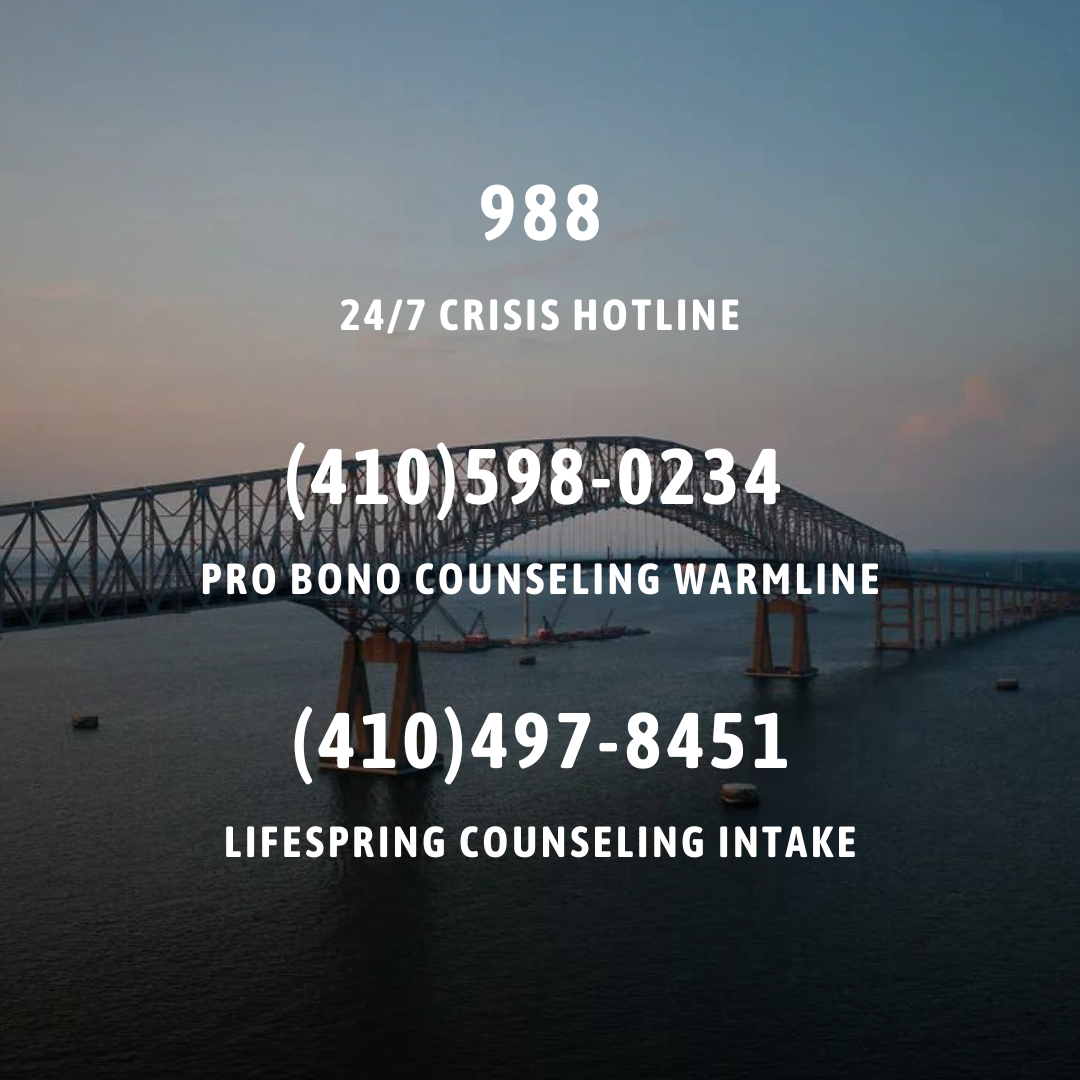Tending to Your Mental Health in the Aftermath of the Baltimore Francis Scott Key Bridge Collapse
Marylanders woke up to the devastating news about the Key Bridge collapsing into the Patapsco River in Baltimore, MD this morning. This tragic event will have ripples of impact for some time to come. If you live or work in the Greater Baltimore area, and you’ve been impacted directly or indirectly by today’s news, here are some strategies that you can use to cope and tend to your mental health.
Limit the time you spend watching the news or reading about it.
For many people, watching the news on repeat or reading article after devastating article can be triggering and upsetting. By now, you probably know everything you need to know about the events that occurred, and it’s OK to turn off the news. If there’s something incredibly important for you to know, it’s likely that someone will tell you about it.
Take a social media break.
Even if you’re not watching the news, social media can be another place where you’re confronted with ongoing images and distressing reminders. Know that it’s OK to take a break from social media, so you can limit exposure to distressing media. This doesn’t mean that you don’t care about what has happened or the people it has impacted. It means that you are aware of the need to protect yourself first.
Ground yourself when you recognize that you’re feeling distressed.
If you’re new to therapist lingo, grounding is just a way of anchoring yourself and bringing yourself back to the present moment. If you’re feeling distressed, lost in thought, or find yourself thinking non-stop about the bridge collapse, try one of these strategies for bringing yourself back to the present moment. Feel your feet firmly planted on the floor. Focus on your breathing by taking slow, relaxing breaths. Use your 5 senses to pay attention to the things that you see, hear, feel, smell, and taste in the present moment. Look for items around you with the color blue.
Seek support from friends, family, and colleagues.
In times of loss and tragedy, being comforted by our community matters! Reach out to friends, family, and colleagues, and let them know how you’re doing. Participating in community events as a volunteer or attending a faith service are other meaningful ways that you can surround yourself with community. The people around us can’t support us if they don’t know we’re struggling. While we are sometimes hesitant to let people know we’re having a hard time, the people around us are often happy and willing to be there for us.
Work through your emotions using creative outlets.
Singing, dancing, journaling, drawing, and painting have long been used as methods to express our feelings and to work through them. If you enjoy music, use that to help you process your emotions. Use dancing or other forms of movement to work out the emotions that are lingering in your body. Write out your feelings or use drawing and painting as another form of emotional expression.
Seek professional support from a local licensed therapist.
If the feelings you’re experiencing are intense or making it difficult for you to function as you normally would on a day-to-day basis, talking with a licensed therapist can help. They can help you understand what you’re experiencing and provide you with coping strategies you can use between sessions. Indicators that might warrant professional attention include: difficulty focusing or concentrating, intrusive thoughts or memories of the distressing event, nightmares, difficulty sleeping, anxiety, worry, feelings of despair or hopelessness. If you’re experiencing these things and can’t seem to shake them after a few days, know that you can reach out for help.
If you’ve been impacted by the recent bridge collapse or have been feeling deeply about it as an empathic person, please use this as an opportunity to be kind and gentle with yourself. During hard times, we need to give ourselves lots of self-compassion (rather than judgment). If your body has been feeling “off,” make note of that and respond to it with kindness. The LifeSpring team is here for you if you need support.
Search Our Other Blogs!
Interested in Counseling in Monkton, MD for Depression, Anxiety, or Coping Skills?
If you’re a Marylander who knows that counseling is the direction you need to take, the therapists at LifeSpring Counseling Services are here to help. We offer online counseling services for mindfulness, depression, anxiety, trauma, and grief and loss. We also offer Brainspotting as a specialized service, and Brainspotting can be done online, too!
Here’s how you can get started! Online & in-person counseling for depression, anxiety, and coping skills aren’t the only services offered at our Monkton, MD office.
The counselors and social workers at our Maryland office also offer counseling services for trauma, grief and loss, boundary setting, communication skills, and difficult life transitions. We also offer specialized counseling services including Brainspotting and spiritually-integrated counseling. Because we are located next to several local universities, we also work with college students and international students.


